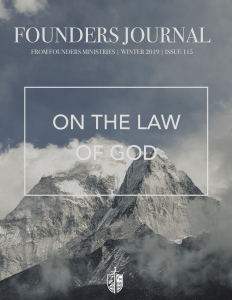Paragraphs 1 and 2
Chapter XIX
Second London Confession
As it states in its preface, or “Epistle to the Judicious and Impartial Reader,” the Second London Baptist Confession of Faith expresses the “fundamental articles of religion.” Among the 32 fundamental articles (i.e., chapters), the nineteenth was dedicated to the law of God. The law deserved its own place within the system of fundamentals because the Scriptures principally teach what man is to believe concerning God (the gospel) and what God requires of man (the law), making the law one half, so to speak, of what should concern the mind of man.
This is not the first place that the law appears in the Confession. Chapter 1 affirms that the written Word of God contains all things necessary for our obedience and service to God. More specifically, we find in SLC 2.2 a passing reference to the distinction between moral law (that which is known and binding by nature) and positive law (that which is known and binding by institution). This reference occurs when the Confession distinguishes between the obedience creatures “owe unto the Creator, and whatever he is further pleased to require of them.” The obedience creatures owe unto their Creator refers to the moral law, binding at all times and places. That which God further requires refers to positive laws instituted for a time and place.
This generic idea of moral and positive law is spelled out in more specific detail in SLC 4.2. First, the Confession mentions “the law of God written in their hearts, and power to fulfill it.” Adam and Eve had a natural knowledge of the moral law, as well as a natural ability to keep it. The next paragraph, SLC 4.3, proceeds from the moral law to positive law. “Besides the law written in their hearts, they received a command not to eat of the tree of knowledge of good and evil.” Adam and Eve were given a positive command in addition to their natural obligations.
Chapter six develops this further, asserting that this law “had been unto life had he kept it” (SLC 6.1). In other words, God made a special arrangement whereby through obedience to the moral law of creation and the positive law of Eden, Adam could have obtained eternal life for himself “and all mankind” (SLC 6.3).
Chapter seven completes the picture of God’s dealings with Adam by affirming that the means through which God provided a reward for Adam’s obedience was a covenant. Because man’s natural obedience to God earns no reward in return, “they could never have attained the reward of life, but by some voluntary condescension on God’s part, which he hath been pleased to express, by way of covenant” (SLC 7.1). As Nehemiah Coxe put it, “None can oblige God, or make him their Debtor, unless he condescend to oblige himself by Covenant or Promise. Such a priviledg, and nearness to God, as is included in Covenant-Interest, cannot immediately result from the relation which they have to God as Creatures…for the Lord owes not unto Man the Good promised in any Covenant he makes with them, antecedently.”1
This survey of the appearance of the law in the early chapters of the Confession of Faith is important because the opening paragraph of chapter nineteen simply summarizes what has already been stated. However, whereas previous chapters focused on other doctrines and mentioned the law only as it related to the doctrines in discussion, chapter nineteen brings the law itself into specific focus and follows it through a historical progression, starting with Adam.
God gave to Adam a law of universal obedience, written in his heart, and a particular precept of not eating the fruit of the tree of knowledge of good and evil; by which he bound him, and all his posterity to personal entire exact and perpetual obedience; promised life upon the fulfilling, and threatened death upon the breach of it, and endued him with power and ability to keep it.2
With the law brought into focus as its own article among the other fundamentals, the Confession immediately returns to the distinction between moral and positive law. There was “a law of universal obedience” that was written on the heart of man. This is natural law, or moral law. It is known by nature and obligatory for all mankind by virtue of the relationship of the creature to the Creator. Being written on the heart of man, there is no man to whom the law does not apply.
In Romans 2:14–15, Paul teaches that those who do not have God’s law written down, externally, nevertheless possess a knowledge of the law that is written on their hearts, internally.
14 For when Gentiles, who do not have the law, by nature do what the law requires, they are a law to themselves, even though they do not have the law. 15 They show that the work of the law is written on their hearts.
Thus, despite man’s fall and suppression of the truth, there is a universal natural knowledge of the universal natural law.
The Confession moves from this to “a particular precept” that is clearly an addition to the universal law of nature. The Scriptures speak of other laws beyond the law of nature, laws that were added for a time but designed to be removed. These are positive laws. For example, Hebrews 9:10 speaks of “regulations for the body imposed until the time of reformation.” In 1 Corinthians 7:19, Paul says that circumcision, a once binding and important command, now counts for nothing. Positive laws, having been added, can also be subtracted.
The Confession then transitions from a description of the law of nature and the positive laws of Eden to the function of the law in the phrase “by which.” The law functioned in three ways. It bound, or obligated, Adam and all his posterity to perfect obedience. It promised Adam and all his posterity life, if obeyed. And it threatened Adam and all his posterity with death, if disobeyed. The Confession adds that God gifted Adam the power and ability to keep the law.
When compared with the Savoy Declaration and the Westminster Confession, the parent and grandparent documents of SLC, one will note that the Baptist editors of the Confession deleted the phrase “as a covenant of works” from this paragraph. Both the Savoy Declaration and Westminster Confession state that God gave Adam the law “as a covenant of works, by which….” The question, then, is why did the Baptists delete the phrase “as a covenant of works”? It is likely impossible to determine exactly why the phrase was deleted. However, several important qualifications must be introduced in order to define the boundaries of our thoughts on this question.
First, it is impossible that this deletion was designed to reject the idea that the law was given to Adam as a covenant of works. Chapters 4, 6, and 7 already specifically stated that the only way in which life could ever have been available as a reward for Adam’s obedience was through God making it available through covenant. And we see here in SLC 19.1 that God “promised life upon the fulfilling [of the law].” So, SLC 19.1 should be read in light of SLC 7.1 which preceded it.
Second, the next chapter opens with the following statement, “The covenant of works being broken by sin, and made unprofitable unto life…” (SLC 20.1). This, again, asserts that life was only available through covenant, a covenant now broken. So, to assert that the deletion of “as a covenant of works” in SLC 19.1 is a rejection of the law being given to Adam as a covenant of works would be to assert, necessarily, that SLC 19.1 contains a direct internal contradiction with SLC 7.1 and 20.1.
Third, external evidence from the Particular Baptists’ writings strongly predisposes our reading of their Confession in favor of the covenant of works. I am aware of at least twenty different Particular Baptist publications in the seventeenth century that affirm a covenant with Adam.3 I am not aware of a single Particular Baptist argument or publication in the seventeenth century that denies a covenant with Adam. When the covenant of works appears in the Particular Baptists’ literature, it is treated as a given. For example,
Who hath any thing to reason against it? Hos. 6.7. the words are, They like Adam have transgressed the Covenant … So that a Covenant passed betwixt God and Adam, for the violation whereof on Adams part, he and his incur’d eternal death.4
As Protestant Divines say; that God made a Covenant of works with Adam, concerning perfect obedience, which he had then power to perform.5
We suppose none will (or can at least Rationally) deny: Forasmuch as Life was Implicitly promised unto our First Parent upon his Obedience, and Death was Explicitely threatned…And upon these terms he was to Stand or Fall; which was plainly and undeniably a Covenant of Works.6
In light of the internal and external evidence, therefore, we can rule out the idea that the deletion of the phrase “as a covenant of works” indicates a rejection of the covenant of works. Several possible explanations may fill in the blanks of why the phrase was deleted.
First, the simplest and most likely explanation is that, as we have noted previously, 19.1 is merely a summary of what has already been confessed in previous chapters.
Second, the purpose of 19.1 in the context of the chapter as a whole is not to develop all of God’s dealings with Adam but specifically to introduce the moral law in a historical progression that begins with Adam.
Third, it is possible that since chapter 19 follows the progression of the law, the Baptists wanted to maintain the focus on the law, as the law. As SLC 7.1 notes, obedience does not earn a reward apart from a covenant. A law alone is merely a law. A law becomes a covenant when God promises a reward in return. And the Baptists do confess in 19.1 that God promised Adam a reward of life for obedience to the law. But it is possible that they deleted the phrase “as a covenant of works” in 19.1 on the one hand because they confessed its theological parts there in the same paragraph and on the other hand because they wanted to preserve the focus of the subsequent paragraphs that trace the progression of the law on its own, not the covenant of works. Supporting such a suggestion is the fact that when the function of the law in the life of the believer is discussed in 19.6, the idea that the law comes to the believer as a covenant of works is specifically ruled out. To repeat the point, chapter 19 is concerned with the law on its own, though it notes the function of the law in various historical contexts along the way. If the law is introduced as a covenant of works in 19.1, it could unintentionally alter or misdirect the focus of the ensuing paragraphs by an assumption that the law is, in itself, a covenant of works.
Paragraph 2 of chapter 19 continues the historical progression of the law.
The same law that was first written in the heart of man, continued to be a perfect rule of righteousness after the fall; and was delivered by God upon Mount Sinai, in Ten Commandments and written in two tables; the four first containing our duty towards God, and the other six our duty to man.7
With history in mind, SLC 19.1 locates the law in the heart of man and the verbal commands delivered in Eden. SLC 19.2 asserts that the law remains written on the heart of man. It is “a perfect rule of righteousness.” It is the standard by which the rectitude of all conduct is measured.
The very same law written on the heart of man, internally, was written down, externally, in the Ten Commandments. This is the first external expression of the natural law. The Confession cites Romans 2:14–15, referenced above as well, to prove this point.
14 For when Gentiles, who do not have the law, by nature do what the law requires, they are a law to themselves, even though they do not have the law. 15 They show that the work of the law is written on their hearts.
Paul’s argument is not just that all men have a natural knowledge of the law of God, but that their natural internal knowledge of the law of God aligns with the law of God written down externally for Israel in the Ten Commandments. When Paul says that Gentiles “do not have the law” he means that they don’t have Exodus 20 or Deuteronomy 5. They do not have the law written in stone, or on paper. But, Paul says, “the law is written on their hearts.” Paul does not speak of a different law being written on the hearts of Gentiles, but the same law that was delivered to Israel.
Particular Baptists such as Nehemiah Coxe and Benjamin Keach affirmed the abiding authority of the moral law of God. Coxe said, “The Law of Creation binds when the Covenant of Creation is broken.”8 Keach said, “The law of the gospel is the same in nature with the moral law, therefore (if it may be called a law) it is a perfect law…The law certainly loses no part of its sanction by the gospel, that is as holy, just, and good as ever, and a perpetual rule of life and obedience.”9
There is an important deletion in this paragraph that deserves attention, as well. The Westminster Confession states not only that the moral law was an abiding rule of righteousness, but also that “as such,” that is, as a rule of life, it was delivered to Israel. The Savoy divines and the Baptist editors of their respective confessions of faith deleted the phrase “as such.” The reason for this deletion does not at all reside in a denial that the moral law was a rule of righteousness for Israel. Such a conclusion is impossible to draw from a paragraph that explicitly states that the moral law remains a rule of righteousness for all men, and was written down for Israel.
As discussed earlier, there is a distinction between the law in itself and the function of the law in historical contexts. All three confessions agree that there is a continuity of law between Eden and Sinai. But the Westminster Confession limited the function of the law at Sinai to a rule of life.
The Savoyans and Baptists affirmed that the law remained a universal obligation for mankind as a rule of life but were open to the possibility that the law was delivered at Sinai for more than just governing conduct. In other words, some of them believed that the Mosaic covenant was a covenant of works.
The Congregationalist divines were heavily influenced by John Cameron’s view of the Mosaic covenant as a subservient covenant of works for Israel. Samuel Bolton translated and reprinted Cameron’s work on the subject with high praise, and Cameron’s model is evident in the thought of Jeremiah Burroughs, Thomas Goodwin, and John Owen. The majority of the Particular Baptists in the seventeenth century, though not all of them, likewise affirmed that the Mosaic covenant, and indeed the Abrahamic covenant, were (subservient) covenants based on obedience, covenants of works.10
By deleting the phrase “as such” in relation to the giving of the law as a rule of life at Sinai, the Congregationalist and Baptist editors of their confessions did not positively assert that the law was given at Sinai as a covenant of works, nor did they deny that the law continued to function as a rule of life for all persons, Israel included. Their deletion removed the limitation imposed by the language of the Westminster Confession and opened the door for the belief that most of them held, that the Mosaic covenant was a covenant of works.
These first two paragraphs establish a foundation for the rest of the chapter. There is a universal natural law known and possessed by nature. This law rules the lives of all persons and was summed up in the Ten Commandments given to Israel at Sinai.
NOTES:
1 Nehemiah Coxe, A Discourse of the Covenants That God made with Men before the Law. Wherein, The Covenant of Circumcision is more largely handled, and the Invalidity of the Plea for Paedobaptism taken from thence discovered (London: John Darby, 1681), 6.
2 Second London Baptist Confession of Faith (SLC) 19.1.
3 The twenty are: Anon, Baptist Catechism, Christopher Blackwood, Philip Cary, Thomas Collier, Hercules Collins, Nehemiah Coxe, Edward Drapes, Thomas Edwards, Thomas Hardcastle, Thomas Harrison, Edward Hutchinson, Benjamin Keach, Elias Keach, William Kiffen, Isaac Marlow, Robert Purnell, Samuel Richardson, Thomas Whinnell, Nathaniel Wyles. If our arguments are sound, we can add to the list 2LCF itself.
4 Christopher Blackwood, A Soul-Searching Catechism (London: J.C., 1653), 12.
5 Edward Hutchinson, A Treatise Concerning the Covenant and Baptism Dialogue-wise, between a Baptist & a Poedo-Baptist, Wherein is shewed, That Believers only are the Spirituall Seed of Abraham; Fully discovering The Fallacy of the Argument drawn from the Birth Priviledge (London: Francis Smith, 1676), 94.
6 Philip Cary, A Solemn Call Unto all that would be owned as Christ’s Faithful Witnesses, speedily, and seriously, to attend unto the Primitive Purity of the Gospel Doctrine and Worship: Or, a Discourse concerning Baptism (London: John Harris, 1690), 121.
7 SLC 19.2.
8 Coxe, A Discourse of the Covenants, 44.
9 Benjamin Keach, A Golden Mine Opened: Or, The Glory of God’s Rich Grace Displayed in the Mediator to Believers: And His Direful Wrath against Impenitent Sinners. Containing the Substance of near Forty Sermons Upon several Subjects (London: William Marshall, 1694), 152–153.
10 Thomas Hardcastle is the only example I know of in the seventeenth century, where a Particular Baptist explicitly affirms that the Mosaic covenant is the covenant of grace, and not a covenant of works. There are other authors, such as Robert Purnell, that seem to hold the same position. And, in fact they were pastors of the same church. This is not to say that there were not other Particular Baptists who believed the same things as Hardcastle. But because Hardcastle’s position appears in an unpublished exposition of the Westminster Larger Catechism, the published literature of the Particular Baptists in the seventeenth century is entirely devoid of this position, to my knowledge.























